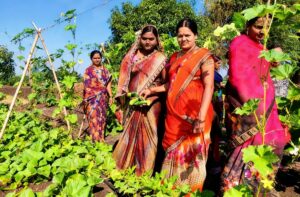by Sugandha Munshi, Amit Srivastava,R.K.Sohane, Anil Kumar Yadav ,Rajesh Kumar ,Prakashan Veetill, Vikram Patil, Paneerselvam,Sonam Sherpa and Virender Kumar
By 2050, feeding a projected population of 9.1 billion will become necessary. This will require an increase in food production by 70% between 2005-2007 and 2050 with developing countries needing to double their production. Achieving this goal demands innovations and collaborative efforts to end global hunger while ensuring nutritional and food security for all.
The challenge is further complicated by climate change and its impact on the entire agriculture system. In South Asia, particularly in the Eastern Gangetic Plain (EGP) region—which includes the Terai of Nepal, all of Bangladesh, and the densely populated states of Eastern India, namely Bihar, Uttar Pradesh, and West Bengal—climate change is having a direct effect on agriculture. Exploring the various dynamics affecting agronomic productivity is crucial to enhancing food production. One significant intervention in this context is optimizing planting dates in the rice-wheat system of the Eastern Gangetic Plains in India. The timing of planting directly influences crop productivity in the region. Given the ongoing changes due to climate, managing optimal planting dates has become a vital agronomic factor for increasing productivity.
The impact of planting dates on rice productivity is paramount. Planting time has consistently been identified as one of the most crucial agronomic variables for increasing yield, and it is expected to remain significant under current and future climate scenarios. Therefore, timely management of optimal planting dates for rice is essential at the farmer’s field to boost rice productivity and advance wheat sowing dates. This helps to avoid terminal heat stress during the maturity stage. Additionally, timely planting improves resource efficiency. It is crucial to approach rice and wheat cultivation as an integrated system to achieve transformative changes in yield patterns.

In eastern India, low productivity poses a challenge, necessitating intensified farming practices. Findings indicate that in the rice-wheat-dominated region, the sowing date of wheat is a key factor affecting productivity. To enhance productivity and quality for smallholder farming households through an inclusive approach, a dedicated intervention has been designed for the Eastern Indo Gangetic Plain (EIGP) in Bihar, India. Under the Excellence in Agronomy (CSISA-EiA) program, this initiative collaborates with partners such as Bihar Agricultural University and the Bihar Rural Livelihoods Promotion Society, commonly known as Jeevika. At the heart of the planting dates strategy is the recommendation for optimal planting dates to ensure timely planting of rice, which facilitates timely wheat planting, thereby avoiding terminal heat stress.
It is important to understand that small and marginal farmers need prompt, useful, and cost-effective solutions. Baseline and landscape diagnostic survey indicate that late planting was widely practiced in Bihar and affected the yield. (Singh.et.al.2020 )
The intervention in the state of Bihar involves conducting field demonstrations and trials with 568 farmers focused on rice and wheat cultivation across seven districts. Additionally, it includes consolidating the results of these on-field demonstrations and developing digital tools in collaboration with the technical partner, IFFCO Kisan. One of these tools is the planting date advisory app, “AgDay.”
The AgDay app provides planting date recommendations to farmers using crop modeling, geospatial data, and trial results. In the Kharif season 2024, it successfully generated advisories for 200 farmers across six districts: Gaya, Nalanda, Lakhisarai, Muzaffarpur, Vaishali, and Samastipur. This initiative followed an institutional capacity-building and training program designed for officials from BAU (Bihar Agricultural University) and Jeevika on how to use the application.
Farmers benefit from the philosophy that “seeing is believing.” Therefore, various travel seminars have been organized at farmers’ plots to enhance their understanding. For instance, during a travel seminar held for farmers in the Kharif and Rabi seasons of 2023, Laxmi Devi, a farmer from Jeevika, shared, “These travel seminars have helped us build confidence in the results of early rice planting, where tillering is strong. They also assist us in sowing wheat earlier. Observing crop cuts in the fields has given us firsthand experience of the positive impacts of adopting improved practices.”
Choosing the right planting date is crucial for improving resource utilization efficiency. A suitable planting date for a specific ecological location allows adequate thermal time to accumulate, which is necessary for the proper growth and development of crops (Abbas et al.). By transplanting rice on time, farmers can reduce terminal heat stress in wheat and terminal drought in rice, thus optimizing the planting schedule in the rice-wheat system. Timely planting benefits both male and female farmers managing this cropping system by helping them avoid terminal heat issues in the region.






